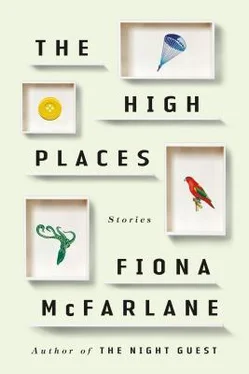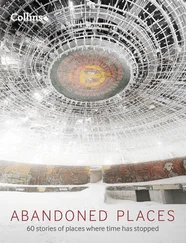‘First I have to leave Eric,’ said Amy. ‘There needs to be a definitive break.’
It was decided they would go away together, Amy and Janet; Amy had finished her Fulbright year and Janet could be spared from work — her teaching credentials weren’t acceptable in England, so she filed records in a doctor’s surgery. Then it became clear that Murray would have to come too, because without Janet he floundered in their dim flat, which felt at this time of year exactly like a sad hotel. Janet had always wanted to go to Cornwall. When they began the drive, with Amy in the back seat, it felt to them all a little like a kidnapping.
This was a bad time to be in Cornwall: early December, the cold days after a flood. Water remained in the low streets of the town in which they rented a small house. The town had gathered itself on the cliffs as if in preparation for a springtime suicide. The houses were narrow and grey, the hills were green, and continual sleet fell over the sea. Amy and Janet ran from their house to the post office, where furniture subsided gently on the spongy floor, so Amy could send a postcard to Eric telling him it was over. They ran home in the wind. They remained inside during a storm that lasted, it seemed, for two days, playing cards and reading novels. Then someone came shaking the door and demanding to be let in.
Janet, afraid of reports to the landlord, opened the door and Eric arrived among them in a gloomy suit. Massive among them, and silent, with an air of inevitability.
‘How did you find me?’ asked Amy, quite calmly, from the couch.
‘The postcard. Then I asked someone at the train station,’ said Eric. ‘You’re the only tourists in town.’
He sat beside Amy on the sofa and rested his head against the wall behind him. It was as if he had run all the way from London, dressed for a funeral. Janet and Murray announced they would go for a walk. It was far too cold to walk. They dressed importantly in boots and hats. Janet imagined herself blown from the cliffs of Cornwall, but Murray held her arm and they struggled to a tearoom. They stayed three hours among the brown wallpaper and granular tablecloths, and when they returned it was as if to Amy’s marital home: Eric, shoeless, spread across the floor, coffee made, and Amy pleased with herself among newspapers.
Eric lay on the floor the way a marble statue sits indifferently on grass. His suit jacket steamed over the radiator. Janet felt herself redden with worry. Was everything settled? Would he stay the night? Should she ask? She didn’t ask. He stayed the night in the tiny house, in Amy’s bed, which struck loudly against the wall between them and the Dwyers. Janet and Murray giggled into their pillows, they clutched each other with the silly primness of the newly married. Amy and Eric’s bed rocked, their own bed shook; all the beds in the riotous house. Murray’s mouth fell against his wife’s and she pulled away, smiling.
‘They’ll hear,’ she said.
They buried themselves in the pillows again. Then crept to the floor. There was a rug that smelled of shoes.
‘Bring down the quilt,’ said Murray.
The quilt over the rug; the Dwyers over the quilt. The Andersons next door, rocking. Only not yet the Andersons — they were married two months later.
‘Aren’t we happy?’ said Janet, rolling on the rug, and they were.
Late in the night she walked through the dark house checking the security of windows and doors, the safety of stoves and electrical cords, afraid that her great happiness might be taken away from her by divine accident. Amy, also walking the house, moving silently on felted feet, met Janet filling a glass of water at the sink. The water poured slowly and quietly, and Janet held one finger in the glass so she could tell when it neared the top.
‘Sorry,’ said Amy.
‘For what?’ asked Janet. She had felt all afternoon that Amy had something to apologise for, although she couldn’t have defined it. But at this moment, her finger bent into the glass, she was certain that none of them need apologise to each other ever again.
‘For creeping up on you in the dark.’
‘I’m just getting a drink,’ said Janet, and the water touched her fingertip. She let it fill the glass and moved her hand so it flooded over her wrist. She felt as if her intimacy with Murray, the privacy of her love and happiness, had expanded so that it now encompassed Amy and Eric. Her happiness pushed against her chest. If she could preserve this, somehow: the town pressing round her, the floodwater soaking into the post office carpets, the bedrooms of the house hanging over her head, with men in them. She felt the security of a house. The water ran into the sink and she turned off the tap.
Amy stood by the kitchen table.
‘Janet,’ she said, ‘you won’t tell Eric about the other one, will you? The man I mentioned?’
‘Of course not. Is everything all right?’ Janet shook her wet fingers.
‘Everything is perfect,’ Amy answered. It seemed that it was. The windows and doors were locked. The men slept on in the house.
* * *
Athens gave Janet unexpected allergies and she fumbled continually with sodden tissues — too thin, they clung to her fingers. She laughed, embarrassed, and brought attention to herself. Amy walked into the hot, quiet hour of the day and returned with a box of smooth handkerchiefs, scalloped in blue.
‘How clever,’ said Janet. ‘I’d never have thought.’
‘You’re the suffering kind,’ said Amy — not true, surely? — ‘who won’t put others out.’ Possibly true, and Janet had never felt so guilty. She was shy behind her quaint handkerchiefs. Money was offered and refused. They were all up on the roof terrace of Amy’s hotel. Husbands lay on lounges behind them, Eric with the newspaper, Murray asleep, hands clasped over his ribs, a midday saint.
‘Hasn’t it been forever?’ said Amy, as if they’d just encountered each other in a supermarket. Forever might have been eight months. ‘Hard to imagine. So many years since Cornwall. Remember Cornwall?’
‘Oh, yes,’ said Janet.
‘Cornwall was wonderful. Lately it’s all I think about. Remember that adorable little house? And drinking sherry from those tiny glasses?’
‘The sherry,’ said Janet. She didn’t remember the sherry.
‘Remember how cold it was? And the coin-operated heating? How worried we were that we’d run out of coins?’ Amy sat with her chin in her hands, and her head was older, thinner, than it had been in Cornwall. ‘You have to wonder what would have happened without Cornwall. Marriage is like that, isn’t it,’ she said. ‘It reaches a point.’
Janet was unsure what point Amy’s marriage might have reached.
‘Why don’t we take a walk, just the two of us?’ said Amy.
Janet was tired. ‘What a good idea,’ she said.
‘We’re going for a walk,’ Amy told Eric. He nodded behind his newspaper. Murray looked so defenceless, asleep on his lounge, that Janet hated to leave him. She and Amy walked out into the exhausted afternoon.
‘You know where I’ll take you,’ said Amy, ‘I’ll take you to that café I was in yesterday morning. Now, if I can just remember how to find it.’
She remembered how to find it; it was only around the corner. It was a very ordinary café, and there were racks of postcards among the outdoor tables, where tourists sat drinking Cokes. Janet had pictured something else. She looked at it from across the street, disappointed.
‘Is this where you met Christos of Marathon?’
Amy was unexpectedly anxious. ‘Oh god, I don’t know what you’re going to say,’ she said. ‘I’m just going to be up front with you. I need a favour.’
‘Of course,’ said Janet, imagining a small loan, imagining confidences about Eric.
Читать дальше












